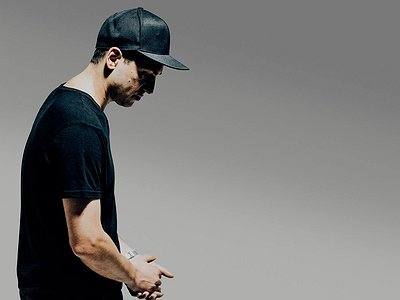Part 2
What constitutes great mixing to you? What are some of the qualities you appreciate in a DJ?
First and foremost, authenticity. I like to see that a DJ loves what he's playing, that he really believes in it. I like it if he takes a risk. He may play music that is not particularly popular, but he'll like it and play it and put his personality in it. And then, afterwards, comes technique.
What's your approach to structuring a DJ-set if you have 3-4 hours? What kind of approach would you be looking for?
What I like is to create a kind of journey. Of course, it also depends on the resident DJ and the kind of mood that's already on the dancefloor. But when I start my set, I just continue with the kind of spirit that is there and try to include everyone on that journey from my own side. I like to play soulful techno, house, sometimes some futuristic sounds, sometimes some classic sounds, but always with a lot of groove. That's the most important thing to me: The rhythm that never stops.
I try to play the music I would like to dance to in a club. I like it if a set is divided into many moments, you know, with different kinds of styles and different kinds of sounds.
I do like sets that build up and up, I like that energy. But lately, I've been playing a lot of long sets and found myself playing more deep and mental music. Stuff that doesn't build up in a break, stuff that builds up inside the rhythm itself. Like adding layers and elements on top. For example, playing with 4 CD-Js, you can experiment a lot. You can use a melody from one track and in the background, there will just be a groove. But maybe in one or two years, I'll change that way. Maybe, I'll find another.
It has today almost become customary to radically change pieces in the act of mixing and to increase the creative input of the DJ even to the level of the actual composition. What's your take on that and in how much do you make use of these possibilities yourself?
There's more and more layering going on in my sets these days. When you're playing every weekend, you're gathering experience and suddenly you find yourself not just playing with two CD-Js, but three or four. I start to mix acapellas, I start to mix two melodies together, two grooves together. These situations can be very complex, but not all of the things I described are happening at the same time. So I'll play the first track, then in the middle of that track, I may feel as though I should put in something else … I end up with another track, then, and that gives me a new basis for putting something on top. So it's not as though I decide to suddenly play four tracks together. And since it's live, something can always go wrong… but I love that feeling!
What are some of the considerations that go into deciding which track to play next?
If I identify with someone else's track, it's very interesting to include it in one of my sets. A DJ set is not just about my own music, there are some records that sound amazing and I totally identify with their message. For example I remember when I listened to old kanzleramt records by Alexander Kowalski – "Speaker Attack", the whole Response album, the whole “Echoes” album – when I listened to that music, I recognised a part of myself in there. There's a part of you in that record, because it remembers something from your own memories. It's the same feeling if you met somebody. He's another person, but may have many things in common with you. And that's the same thing when you put on a record – it remembers a little part of you, a part of your soul. It's like an echo of your memory.
That's what DJing is about: Using not just your own music, but other people's music to create new things. And at some point connect your music with a song made by another person. It’s an universal language. If you think about that, it’s really interesting. That person can be from another city, country, or from another genre of music… You know what happens to me a lot: I produce a track, I give it a title and then I'll get an email from somebody saying: I think you wanted to express this with that track. And I'll go: Wow, you nailed it! (laughs)
How do you see the balance between giving the crowd what they want and treating them to something new? What's your take on the idea of the DJ as an "educator" and is the relationship with the dancers a collaborative one or, as Derrick May once put it, a “battle”?
When I had my residency at Blau Club long time ago, it made me understand important things about club music. You learn to adapt to different situations: Playing long sets, playing in front of different crowds, playing in bigger rooms … you get to see the hole diversity of people coming to the club. You'll understand that there are people who will dance a lot, while others may not be dancing physically, but in their head. And they may be enjoying the set just as much! They will be standing in front of the booth and smiling, having a good time. And then you start to understand the culture of electronic music, this universal language. And you can connect with people on different levels.
Of course I've been in the situation of being asked to change my style or play a specific track, specially when I started years ago as a resident. I think all Djs had a moment like that at some point. I remember thinking myself: If someone requests a mainstream pop track, I'll simply tell them to visit another room and maybe they'll have it there. – I tried to be always respectful and patient when that happened. In any case, DJ culture has also become bigger and you can sense the respect usually. And what will sometimes happen with strange requests is that you tell the guy: I know this is not what you came here for, but why don't you stay a bit and see what happens. And maybe at the end, the guy will come back and tell you he had a great time.
With more and more musicians creating than ever and more and more of these creations being released, what does this mean for you as an artist in terms of originality? What are some of the areas where you currently see the greatest potential for originality and who are some of the artists and communities that you find inspiring in this regard?
I think the most important is that you use all your influences to create your own thing in an organic way. There’s lot of music being released these days, but I still find amazing stuff and get surprised every day. With regards to the people I personally like their music at the moment: Kink, Scuba, Special Request, Daniel Avery, Dusky… There are also great artists doing fantastic music from Spain. People like Uner, Coyu, Edu Imbernon, Henry Saiz. Cora Novoa… her new album is amazing, she's very talented. We know each other for many years and I feel very proud to see how our scene is developing.
Why do you think has DJing remained so relevant for such a long time? Why are people still clubbing?
I think it's because it's something that we're born with. It's something that's inside of us. Music is a universal language and in general, we're social beings. It's something very appealing, at least for me, that you can communicate with people without speaking. In clubbing, everything is about music, about having a good time, and at the same time, discovering and communicating with this beautiful form. Maybe the exact form will change, but that experience will always remain relevant. You can do a techno party at your home, you can do a techno party at a festival, a small club, here in the bar, where we are drinking a coffee. You know how techno has always been related to technology and how it has had this futuristic sheen? I think we are entering a phase where this technology is undergoing incisive changes and it will somehow match the music we’ll hear.
If you liked this interview with Dosem, visit his personal website for further information.






